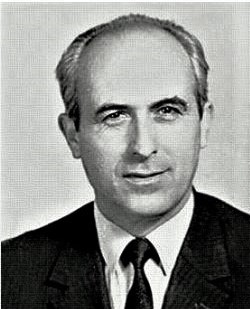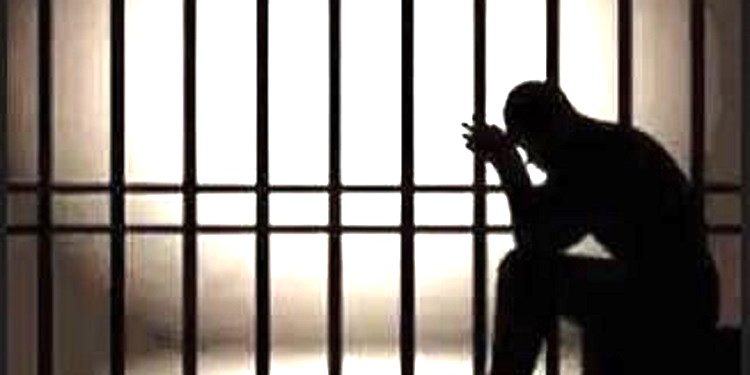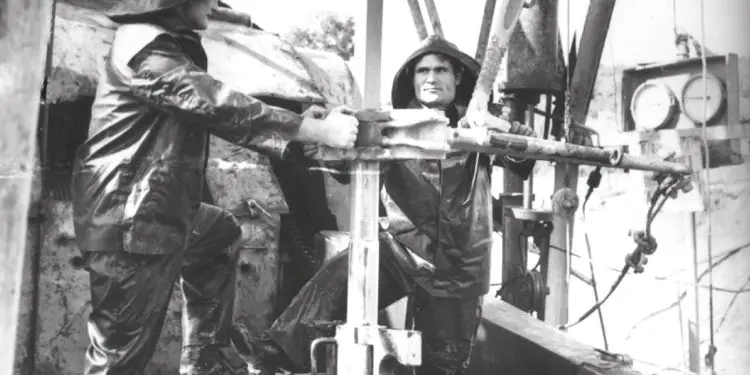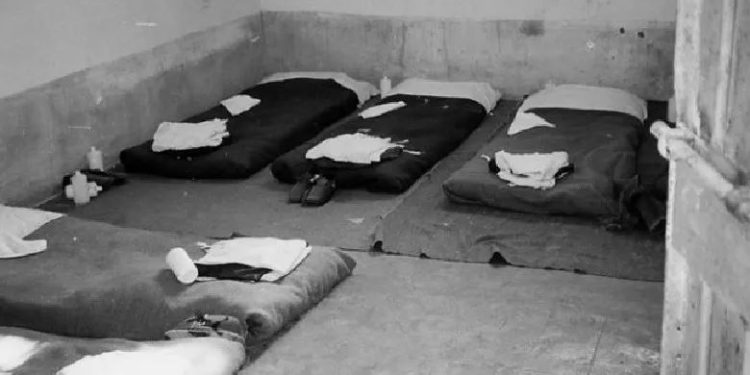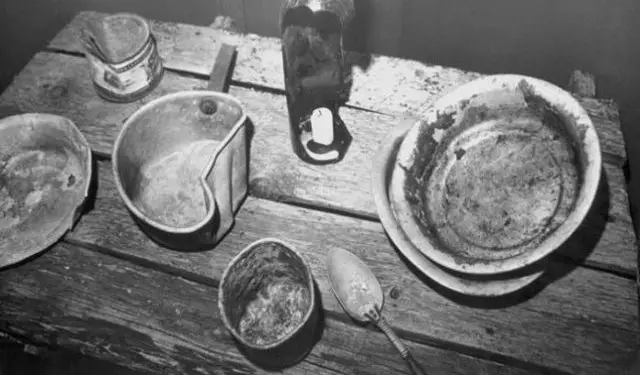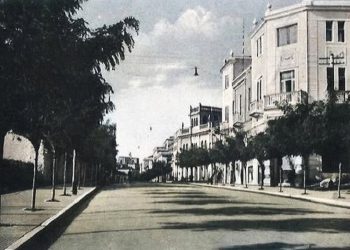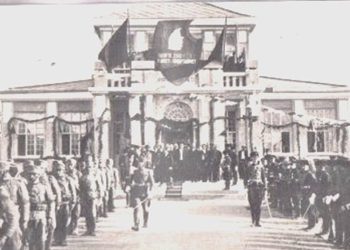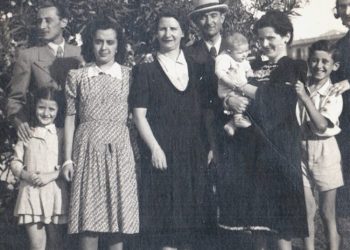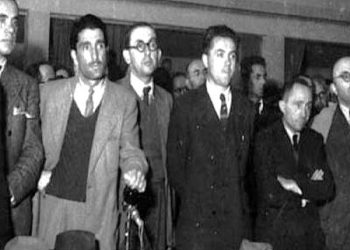By Petraq Xhaçka
Part thirty three
Memorie.al/ The purpose of this book is to join the efforts made to present the truths and horrors of the communist dictatorship in Albania. The main purpose of the book is not to show our people or anyone else, that we oilmen have been innocent, because this has become known from publications in our press, from foreign televisions, as well as from direct meetings with the International Forum and the Albanian Human Rights. The author’s desire, is that through this story, along with other stories, fight any manifestation in any form, even moderate, that he may have to create a communist society. I think that even through this bitter personal history, the cruel, treacherous and overbearing face of Enverism will appear, that for half a century, held the knife with the tip in the chest of the Albanian people, with a pine eye, intercepting the movements for salvation from the outside, or rebellion of the people themselves, ready to push the knife to the heart, at the first movement. The events are set in the economic fields where it has appeared most strongly, such as the oil and gas industry, where I was fortunate to pour my energies, for a lifetime, and become a participant and witness in those events. All the events that are written in this memoir are true, not only without any exaggeration or embellishment, but perhaps, I don’t know how much I have been able to present the terrifying force of the events that took place in that decadent system of socialism, where no there was no human feeling.
Continues from last issue
The next morning the car-jail was waiting for us. Again a long journey, full of hardships, vomiting and headaches, until we arrived at the Inner Branch of Fier. There we were met by the police, who took us to a small camp, which previously served as the car office and which was adjacent to the main body. It was a shack surrounded by barbed wire and guarded.
There we found a room, where two work tables were placed, with some chairs, and through another door we entered a room about four meters by four, which would serve as our bedroom. In this bedroom, four single beds, with springs and new equipment of blankets and sheets, as well as a table with four chairs, as many as we were, were arranged in order to eat the food. The accompanying policeman told us to arrange ourselves as we wished. The room had only one small window, but it was, as always as, higher than our heads could reach. Thus, we found a completely different treatment there, and it seems they wanted to treat us better, to lie to us, so that we could deal with projects.
The barrack had another, larger compartment; about six meters by six, and on the two longest sides, there were two layers of boards, on which about forty ordinary prisoners slept. Some slept downstairs and some slept upstairs, what could be worse. In the middle, a small lounge was built, where a television was placed, in front of which the prisoners gathered. At dinner we were also taken there, but we sat in the last bunk, so that we would not have any contact with the ordinary prisoners, but nevertheless, the policeman in charge of control was never absent. To the right of the salon, there was a small entrance, where there was also a sink, to wash ourselves, as well as to wash the dishes we used.
The next day, the Deputy Minister of Internal Affairs was there, with two other followers. He informed us that special measures had been taken for us to live and work there. They would bring us the geological and geophysical materials we would need, as well as other laboratory data, to carry out comprehensive studies and well designs. He mentioned both their initial request and the term we defined, design and general studies. Despite the fact that we had categorically opposed, they thought again, to put us in front of the facts, thinking that we would break. After he finished talking, as we had done recently, I took the floor.
– Comrade Deputy Minister, we have explained to you, but due to our ignorance, we have not made it clear that we agree to deal with studies, because studies are in our blood. As for designing wells, I for myself, I emphasize that I speak for myself, I never do it again. You condemned us for this, and now you tell us again to design oil wells! We’re sorry, but please don’t take us for fools! Then he showed me the revolver he was carrying in his belt and said: – “Whether you want it or not, you will design research wells!” We give you a definite order! And you see this cobra here? If you didn’t find oil and gas, this is waiting for you”!
When the threat with a gun in hand ended, as we expected, I insisted on our position again: – We are professionals; we are scientific workers and not fortune tellers, so that we know exactly where there is still oil and gas. You cannot find such people anywhere in the world. I cannot understand how you ask for this impossible thing! That’s why you put us in prison, so that we work with the fear of the devil…?! No gentlemen, I will not do this again! My intervention infuriated him even more. He blushed, and foamed at my face: – “Look, you’re talking a bit too much, but we have Burrell ready for you. We have other measures if you don’t accept it”.
In support of my position, other colleagues immediately stood up and spoke. The senior official, faced with such adamant opposition from the entire group, got up angrily and left. As the popular saying goes, this time, he got the nail stuck in the wall. He failed in one of the objects of our arrest, that which we projected under the barrel of the cobra.
They thought, however, that over time, lured by some better living conditions they had created for us, we would break down and agree to design. So after two days, they came and asked us what materials we were looking for and from which region we would start. We chose a region and got into the study work, which helped us to keep ourselves alive and even with some optimism. We wasted hours on these materials.
They received the data we needed from the Institute, but with great delays. There were days and weeks that we were waiting for the materials. After several months of study work, we completed the assessment of the region we received, but we did not do well designs at all. We left it to the employees of the Institute of Geophysics to do this work. We did not retreat from our upright position. During this period, a director from the Ministry of the Interior came there several times, the first cousin of Enver Hoxha’s son-in-law, the senior officer of the Security, Engjell Kolaneci, who was much respected. He also threatened us and asked us to design, but we kept the same attitude and never backed down.
Then they brought us other materials, but we did our own: only generalizations and evaluations. This match continued for about a year and a half, until the second half of 1988.
We had satisfactory living conditions here. The food was better and we were rewarded, with a very small salary. However, this was an income not to be scorned. That money went into our work, to buy food and cigarettes, and as a result we partially relieved our families, considering that the command provided us with enough needs. The state mainly provided us with sugar, flour, rice and cigarettes. The families, now we were happy to have them around, brought us special dishes, which we could not make in those conditions.
In addition, for this period we were relieved from the prison regime. We were spared the three appeals that made us sit outside for hours in the rain, snow, or extreme heat. The appeal was made by the policeman himself, who dropped the dish three times a day. We escaped from those boring political readings, with endless hours for each day. Our natural love for work led us to sit hunched over our desks, not eight, as we were supposed to, but ten and twelve hours a day. We had been educated a whole life with this work regime, and we could not easily leave this practice. We hated the system, but not the work.
Seeing that we refused to make projections, the capital masters of our dramas, were forced to give up the point of the plan thought before our arrest, which was to create a complex group, of two geologists and two geophysicists, who would work with the fear of death. Thus, dissatisfied with our stay, after this intermediate period in Fier, they sent us back to the camp of Saint Vasi, in Saranda.
We were again subjected to that boring regime of the camp with the endless appeals, the forced collective readings, the very poor food, and the harsh living conditions. Here, even from the family, they could not bring us many things, because in the great heat, the food did not last and spoiled during the long journey, which often lasted two days.
Only the cheese could last a few days, after which we wrapped it in wet clothes with a lot of salt. Everything else had to be consumed within two or three days. But until the next meeting, you had to wait one more month, and sometimes two months, because due to holidays and other events, the prison command stopped visits altogether. For the three hundred people in the camp, there was only a small television, which they placed outside and we sat on some stairs, which we had built adapted to the steep terrain. We stayed for hours in front of the screen, with those poor programs, which were an hour away from the slanderous politicization: We watched the only channel, that of the Tirana station, and whether we wanted to or not, we had to stay in front of the screen until the hour came ten, which was the hour of the last appeal, on the eve of sleep.
Boredom, suffering from the prison regime, from the harsh living conditions, from sleeping in rooms with over thirty people, where the stench of unwashed bodies raged, but especially of unwashed clothes, which some prisoners kept for weeks without removed from him, as well as the very inhuman behavior of policemen and officers, made prison life very difficult.
Above all, the most unbearable was the atmosphere when a prisoner died. And this was frequent, because this camp, as I have emphasized, was mainly for the elderly and the sick, which in these conditions could not resist and died prematurely. The height of the anti-human attitude was that even when the prisoner died, the corpse was not given to the family to be buried in the ground, but they buried him there, with a few pieces of board, without a coffin, in anonymous pits, without sketches or signs, which did not even command he did not know where he had spent them. The only sign, if it can be called that, was a bottle with the name of the dead, which they put in the pit they flattened and after two months, it became one with the meadow or the hillside.
Recently, the command became a little tamer, as it began to record the places where the dead were buried, but only she knew them. And under the new guidelines, the family could retrieve the skeleton only when the sentence was served. They wanted to fulfill the sentence not only alive, but also dead! Nothing more barbaric than this, a person can think in a time of peace, not war.
In the Saint Vasija camp, the prisoners who died in the evening were placed lying on the floor, in the damp space near the sinks where we bathed. It was an amazing sight. The weight of that rape of the corpse pressed down on the chest, left there like a dirty den, there was no special place to avoid the sight that struck the sight of those who came to wash their hands. Therefore, when someone died, the prisoners of St. Vasi became gloomy and sad. None of us went to bathe because we couldn’t stand the corpse lying on the cement square of the bathroom. At the very least, that sight made you think that you too would end up like that, right there in that place, and the prisoners you left behind would refuse to come and wash their faces. On such days, it was very difficult to fall asleep.
In Saint Vasi, there was a prisoner named Baftjar Jiraj from Durrës, who died before the new instructions on cases of death. After the calculations, the command told him to get ready that they would release him the next morning at seven o’clock sharp. In the afternoon before his release, Baftjar Xhiraj greeted the prisoners, barely containing his boundless joy that he would return to his family after many years. Unfortunately for him, that midnight, he died of a heart attack. In the morning, the brother, who came, thinking that the freed Baftjar would be waiting for him outside the gate, was told to report to the camp offices.
He asked there at what time they would release his brother and they gave him the bitter news that Baftjar Jiraj had died last night, at midnight. In the midst of that great sorrow, the brother asked to take the body of the dead, to bury it in Durrës, and escort it to the family. But no! The leaders of the camp, in agreement with their superiors, did not give him the body, because he finished his sentence at seven o’clock in the morning, so Baftjari had to be buried in the valleys of the camp, because the procedures in this case were for the withdrawal of dead, dead within the prison term. This took time, because the relevant permits had to be obtained. Despite his brother’s numerous protests, the camp command did not give him the corpse, because it is true that Baftjar had served many years in prison, but he was considered dead in prison, because he still had seven hours of prison to do.
And so, this citizen of Durrës was buried at the base of a tree, I don’t know where and I don’t know if the family could take him later or not, so that he could cry for the second time. Many people who heard this story did not believe it and it seemed strange to them, but it is one of the typical wonders of that life that Albanians have done for four decades. With these conditions, with these tensions and great nervous stress, with these difficulties, we spent days, weeks, months and years.
One beautiful morning, at the beginning of 1989, Enrikon and I were called to the camp offices, they told us to get ready immediately, that in a few hours, we would have a new transfer. As usual, they didn’t tell us where they were going to take us. This was the separation we made with Mynyri and Petriti, with whom we stayed together in the same camp until that day.
For the trip this time luck helped us, because we were not put in a car-prison, but in a covered truck, where there were several ordinary prisoners and two political prisoners. In the carriage, we traveled in pairs, and sat cross-legged on the floor, so that all the way, the potholes tore our bottoms to pieces. However, we made the trip much better than by car.
During this endless journey, Enrikoja and I exchanged some guesses as to where they were taking us, but of course it was very difficult to find where. The soldiers were sitting on the side benches, guarding us and not uttering a word about the address. Finally, in the afternoon, we arrived at another prison camp, inside the capital. When we got off the truck body, we learned that this new place was called the ordinary prisoners’ camp, in the “Ali Demi” neighborhood of Tirana.
Office of Prisoner Interpreters, Ministry of Internal Affairs
The prison camp was set up on a small hill, surrounded by barbed wire all around. He did not have the size of Zejmen and Saint Vasya. Enrico and I were directed to a corner, to the left of the entrance to this camp, where there was a large room, isolated by wire from the rest of the camp. It was, so to speak, a small enclosure, within an enclosure. This section had a small courtyard paved with cement, at the end of which, there was another small room for washing and cooking. Inside the main room, we found five other prisoners, who at the time were sitting at their desks working.
They welcomed us politely and explained to us that there was the translation office, complete with prisoner translators, that the Ministry of the Interior had set up for the needs of the Albanian translation of various books, with information on foreign intelligence services, on tools and the various devices used by these secret services, the various prison laws, the rights of prisoners, and even the constitutions of the various states. This large room was used both for work and for sleeping. There were four bunk beds, alla sailors.
After we let them know who we were, we learned that two of them were highly educated, one a mining engineer from Durrës and the other an educator. The other three had secondary education and had learned foreign languages while serving their sentence, especially during the period they lived in Burrel prison. They were very kind, they offered us their friendship and in the first weeks, they helped us without sparing in translations, in better acquiring the language and the translation technique. It turned out that I was the only translator from the Russian language, which I mastered quite well.
But there they also asked us to translate from French, even though I had many shortcomings, because for decades, I had not used what I had learned at school and privately, from my father. Through the dictionary, research work and help from senior translators, I was able to translate important material, which was approved by the language specialists who checked it in the ministry. While Enrikoja, acquired the English language much better and managed to make translations with a good quality, she never had any remarks.
The next day, a representative of the Directorate of Camps and Prisons, near the Ministry of the Interior, showed us our new task, which had already been explained to us at dinner by our older Burgajin colleagues. / Memorie.al
The next issue follows




